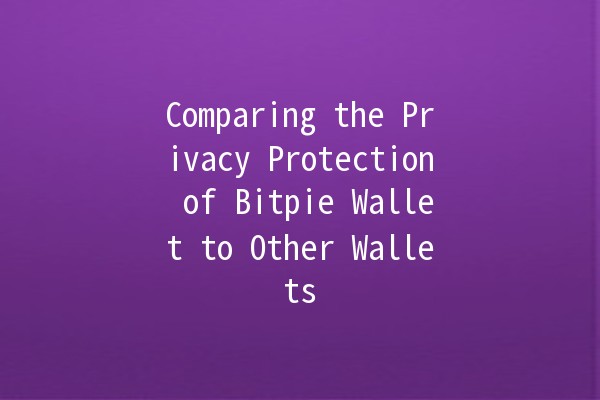




In the evolving world of cryptocurrency, the safety of digital assets has never been more crucial. With an increasing number of users entering the space, the need for secure wallets is rapidly rising. Among these options, the Bitpie wallet stands out, particularly due to its strong focus on privacy protections. In this article, we will explore how Bitpie compares to other wallets regarding privacy measures, functionality, and user control over personal data. We will also provide practical tips for enhancing your cryptocurrency security and privacy while using wallets.
Cryptocurrency wallets act as gateways between users and the blockchain. While many wallets provide access to assets, they often come with varying degrees of privacy protections. The significance of privacy in this context cannot be overstated.

One of the strongest privacy features of Bitpie is its noncustodial model. Users maintain full control over their private keys, contrasting many custodial wallets where third parties hold the keys. This differentiation allows users to be the sole owners of their private information.
Example: In a custodial wallet, if a hack occurs on the service provider’s side, users risk losing access. With Bitpie, even if the platform is compromised, your private keys—and thus your assets—remain secure.
Bitpie implements robust encryption techniques to secure user data and transaction information. By encrypting usernames, passwords, and sensitive transactions, the wallet offers a layer of protection against potential breaches.
Example: A recent case involved a popular wallet that suffered from data leakage due to inadequate encryption practices. Users lost trust, while Bitpie stood firm, showcasing the strength of its encryption protocols.
To further protect users, Bitpie offers various anonymity features, such as coin mixing services and the option to generate multiple wallet addresses. These measures can obfuscate transaction trails, making it significantly harder to link transactions to users.
Example: By creating multiple addresses for different transactions, users can prevent outside observers from easily determining their asset accumulation patterns, unlike in less private wallets.
Bitpie’s opensource code allows developers and security experts to audit the wallet for vulnerabilities. This transparency builds user trust and encourages a communitydriven effort to fortify privacy protections.
Example: An independent audit discovered a potential vulnerability in another wallet but found none in Bitpie. This process enhances users’ confidence that their digital assets are safer.
While 2FA is a common feature across wallets, Bitpie’s seamless integration ensures that even users unfamiliar with the technology can easily enable it. This additional layer of security helps further safeguard accounts from unauthorized access.
Example: A user who activates 2FA after losing access to their account results in a stronger defense against hacking attempts. Bitpie ensures that user data remains intact.
While Bitpie emphasizes privacy, it is essential to contrast these features against other wallets available in the market.
Many popular wallets, such as Coinbase and Binance, play custodial roles. Although they offer a userfriendly experience, they require users to trust third parties with their private keys. Bitpie’s noncustodial approach allows for greater privacy and independence.
Some wallets focus on privacy coins, such as Monero or Zcash, offering unique features designed to mask transactions. However, using these wallets can limit the versatility of assets that users can manage. Bitpie allows users to handle various cryptocurrencies while preserving privacy.
Wallets like Exodus and Trust Wallet may provide better user experiences with intuitive interfaces. However, they might not have the same level of privacycentric features as Bitpie.
While many wallets claim to offer security, Bitpie benefits from its opensource nature, ensuring community trust through transparency. Many wallets choose closedsource methods, limiting user confidence in their privacy measures.
Encryption protocols can vary widely among wallet providers. While Bitpie employs advanced encryption technologies, others may use outdated methods susceptible to breaches.
Application:
A user could store less frequently used funds in a custodial wallet while keeping active trading assets in a more private noncustodial wallet like Bitpie.
Application:
Set up transaction alerts to monitor any unauthorized access attempts to early respond to potential threats.
Application:
By partnering with a VPN service while using your wallet, you can add an anonymous layer on top of your transactions to avoid geographical tracking.
Application:
Attend community webinars or follow reputable sources in the crypto space to learn about threats and protective measures.
Application:
Use hardware or encrypted USB drives to store backup files securely, minimizing the risk of losing access.
Bitpie’s noncustodial approach, strong encryption protocols, and anonymity features allow users to maintain greater control over their data and transactions, enhancing overall privacy.
Yes, Bitpie supports various cryptocurrencies, allowing users to engage in trading while maintaining privacy.
Users retain complete ownership of their keys, which are stored locally on the user's device, ensuring that no external entities can access them.
While Bitpie offers features to enhance anonymity, no transaction can be entirely untraceable. However, the use of multiple wallet addresses and mixing services can obscure transaction trails.
Immediately change your passwords, enable twofactor authentication, and conduct a comprehensive review of recent activity to detect any unusual transactions.
While noncustodial wallets offer greater privacy and control, users must be diligent in securing their private keys, as loss or theft can lead to irreversible asset loss.
When considering a wallet for your cryptocurrency needs, especially in terms of privacy, comparing features becomes essential. Bitpie emerges as a strong contender, providing exceptional privacy features and user control compared to its competitors. By adopting best practices for securing your digital assets, you can better navigate the privacy landscape of cryptocurrency.
Now that you are equipped with insights into the privacy features of Bitpie and comparisons to other wallets, it is time to explore and secure your crypto journey effectively!